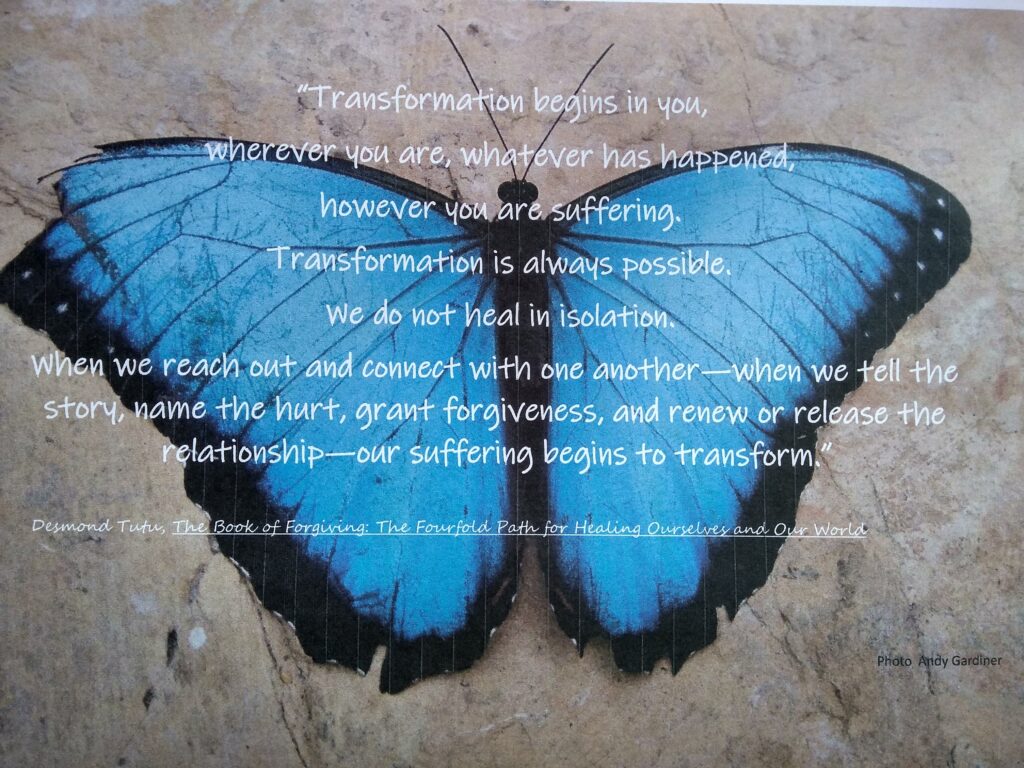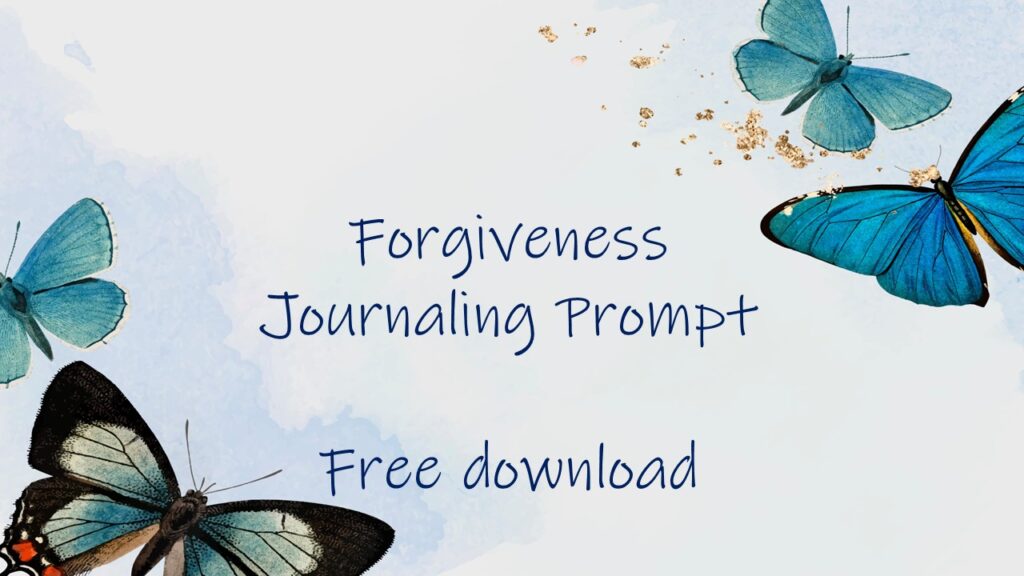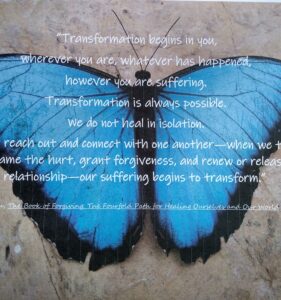Forgiveness. Forgiveness cannot be rushed. “I forgive you” is a process, not a sentence. Forgiveness burns in our chest, sweats tears of anguish, wriggles and squirms, silently screams in fear, rages against the injustice of it all, and brings inner peace.
Forgiveness is not easy. It cannot be required or imposed by another person or institution. It does not sweep under the carpet, cover up or protect the perpetrator. It does not let the offender off the hook.
Wherever I encounter forgiveness, there seems to be a consensus that forgiveness is for the benefit of the victim, not the perpetrator. It gifts inner freedom from hate, chronic anger and resentment. It sets the victim free to live their life in peace.
Forgiving yourself is the most important – and the most difficult.
In The Book of Forgiving by Desmond and Mpho Tutu, they describe a fourfold path to forgiveness, born out of their experience of apartheid, the murder of a close friend and the truth and reconciliation project in South Africa.
The first two steps involve admitting the wrong, and the harm it did, including feeling the anguish it caused. These steps cannot be glossed over. We cannot pay lip service to forgiveness – saying we forgive intellectually because it is what is expected of us by our moral code or religion.
Sometimes, not telling the story of what happened, and naming the harm it caused goes so far as covering up the wrong to protect the offender. Other times, we cannot admit to ourselves something we have done, or our belief that a wrong was our fault.
Shining a light on what is hiding in the shadow allows it to be spoken, witnessed and heard. It grants the opportunity for growth and change. True transformation cannot occur while wrongs remain unspoken, boxed up or buried.
In the truth and reconciliation project, victims were given the opportunity to tell their stories to those who had committed the crimes. Restorative justice programmes offer similar opportunities in some justice systems. Other times it is simply done through personal dialogue, journalling or speaking with a trusted friend or therapist.
The third step is to ask for and grant forgiveness. There are a few things to note here. Forgiving someone does not require them to ask for forgiveness. A person can deny a wrong completely, and the victim can still forgive them. Forgiveness is for the benefit of the victim.
Similarly, forgiving yourself does not depend on anyone else forgiving you.
Also, forgiveness does not mean justice is not also sought or served, or that the wrong does not matter. Consequences may well still follow. Forgiveness cannot bring the dead to life, restore a lost childhood, or erase the memories that have caused a loss of trust. Forgiveness is inner work, that brings inner tranquillity to troubled waters.
I do not find forgiveness to be a virtue someone can be exhorted to exercise. Nor do I find it to be some kind of transaction.
I meet forgiveness as an invitation to let go of the inner destructiveness of hate. I find it to be an invitation to step into the flow of love again; to love myself and recognise that common humanity in all of us.
This third step is based on empathy. It is recognising that intrinsic worth as human beings in all of us, that sacredness and woundedness of the human soul.
In the book, they describe an exercise where we write the wrongs of a person in the sand on a beach, and their loving actions on a rock. The sea comes in and washes away the wrongs. The love remains.
We can do the same for ourselves. We are just as human as everyone else. We are only human; in that we too wrong others and ourselves. We are also human; in that we share the same intrinsic value and worth. We too are the beloved. I find that the more I am able to forgive my own imperfections, and come to accept myself as I am, the more I can forgive and accept others, warts and all.
A most powerful paragraph in the book The Choice by Edith Eger, an Auschwitz survivor, is when she returns to Auschwitz years later, and recalls standing in the line on their entry to the camp. The guard asked her if her mother was her mother, or her sister. She replied, “My Mother.” Those words condemned her mother to instant death in the gas chambers, as only younger women were being kept alive. Telling that story to her own, now adult daughter, allows Edith to forgive herself, and allows deeper healing of her terrible trauma.
All the while we harbour hate towards ourselves for our real or perceived failings, we project this anger and dysfunction on to our loved ones around us. Forgiving ourselves, accepting our own humanity, sets us free to live imperfectly, with joy. It opens up that accepting space for others.
The fourth step is renewing or releasing the relationship. All too often, it is assumed that forgiveness equals reconciliation. Many times, it does. It can be a very necessary part of any healthy relationship and happen over and over again.
However, there are times when we choose not to renew a relationship. That does not mean we have not forgiven. It is a perfectly legitimate choice to make. Sometimes it is a very necessary expression of self-care and self-protection – for example for people escaping domestic abuse. There is no need to feel guilty if that is your choice with a certain person or people. I will write more about estrangement in another blog post.
And with great compassion I write that sometimes releasing the relationship is the choice we want to make, but circumstances prevent it. For example, when parenting or care-giving responsibilities are shared with the perpetrator. This is a very difficult and often painful path to walk. It requires firm boundaries to be set, and often mediators willing to step in and help. The cycle of forgiveness will need to be practiced over and over again. I see and hear your anguish.




Pingback: Book review – Book of forgiving by Desmond & Mpho Tutu - returning home to yourself
Pingback: Estrangement – Weak and Wrong or Healthy and Strong? - returning home to yourself